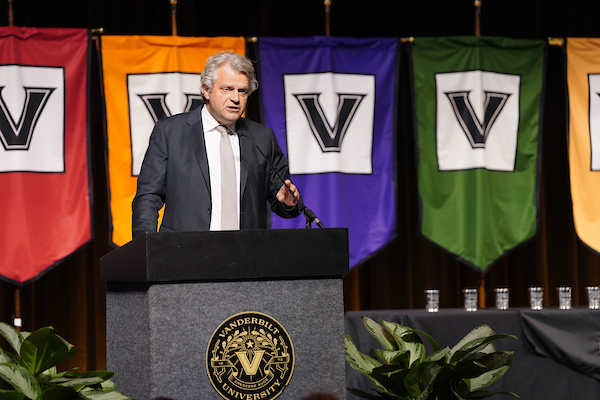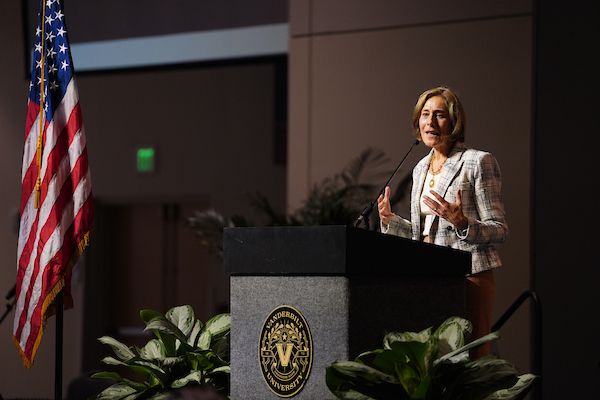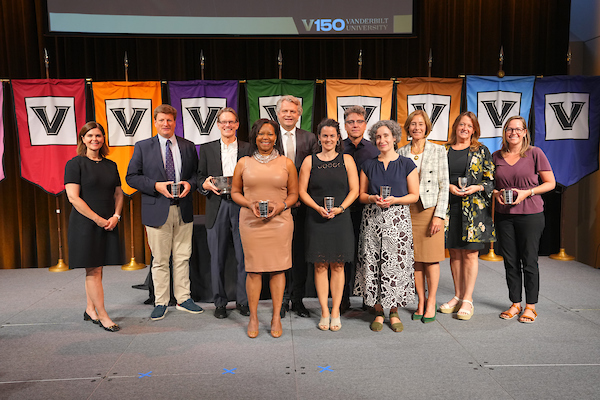Vanderbilt is thriving by every measure, even as higher education on the whole faces significant headwinds. Though the university is not immune to these challenges, it must dare to grow despite them, Chancellor Daniel Diermeier told faculty gathered for the annual Fall Faculty Assembly on Aug. 24.
This year’s event, which included the presentation of some of the university’s most prestigious awards, was held in person at the Student Life Center.
Vanderbilt is more financially sound than at any point in its history, Diermeier said, and 2023 marks the university’s single-largest fundraising year ever. The university continues to enroll the most qualified undergraduates and recruit the most accomplished faculty. Its research enterprise and ability to translate discoveries into real-world applications are flourishing.
While all key indicators are trending upward for the university, higher education is facing extraordinary criticism at all levels, Diermeier said. He cited the U.S. Supreme Court’s ruling in June that race-conscious admissions practices violate the Constitution, saying the decision left him “deeply disappointed” as it makes it more difficult for universities to foster a rich and dynamic campus culture.

“Diversity is essential to dialogue, learning, innovation and growth for every member of our community,” he said. “Vanderbilt will always recruit a wide and deep pool of applicants, consistent with our academic mission and our core value of equal opportunity for all.”
Vanderbilt will continue to build diverse incoming classes and create an environment of belonging while complying with the law, he added. A university task force has been appointed and will work closely with the Office of General Counsel to review the new federal guidelines and help inform how the university adapts its admissions practices.
Diermeier also cited the cacophony of voices criticizing how universities are run without understanding the complex rules and restrictions that govern how institutions may use their endowments, or the strategy behind how funds are allocated for greatest effect. Despite these critical voices, Vanderbilt will continue to advocate for increased funding for research and student support. It will continue to expand its global presence and embrace even more closely its signature practice of radical collaboration. And the university will continue to lead by example.
“Headwinds from criticism can make our work more difficult. But we are moving forward nonetheless—as Vanderbilt always has—with faith in our values, in our mission and in our shared purpose,” Diermeier said.
“In this, our Sesquicentennial year, we continue to pursue our vision of being nothing less than the great university of the 21st century,” he said. “We are all, together as one community, engaged in a noble mission. We will continue to explain and demonstrate the immense social value of research universities like ours, to advocate for these marvelous institutions that are criticized here at home yet are the envy of the world.”
Free expression and launch of Dialogue Vanderbilt
Vanderbilt also will redouble its commitment to free expression, Diermeier said. “This is fundamental to who we are here at Vanderbilt. We have believed from our beginning, from the founding of this university, in the power of bringing people of differing viewpoints together in common purpose.”
Free expression rests on three pillars, he said.
- Open forums are the many spaces on campus where issues can be discussed without threat of censorship.
- Institutional neutrality is the commitment that senior leaders make to not take public positions on controversial issues—unless the issue is directly related to the functioning of the university.
- Civil discourse is the practice of engaging in conversation and debate in a constructive manner that demonstrates respect for those on the other side of an issue.
“I want to be clear: Institutional neutrality does not obligate you to be silent on any issue—on the contrary,” Diermeier told faculty. “The aim of institutional neutrality is to allow the greatest possible space for your voices, and for those of your students, by avoiding any signal that there’s a preferred point of view or party line at our university. We want you to speak up—and we will encourage and support you to do so—and to argue with the courage of your convictions, and the university’s staff and resources are here to help you and support you.
“The practice of institutional neutrality is an acknowledgement that the role of a university is to encourage debates—not to settle them,” said Diermeier, who noted the Faculty Senate will host an in-depth discussion on institutional neutrality Aug. 28.
In support of these core values, the university has launched Dialogue Vanderbilt, an initiative to teach members of the university community how to engage in constructive conversation, even when they fiercely disagree; to conduct research on polarization and how to address it; and to lead a broader effort to restore civil discourse in society.
“One of the most important things we are doing with Dialogue Vanderbilt is giving our undergraduate students the skills to discuss and debate with each other respectfully, without rushing to righteousness or shrinking from the challenge, so that they are prepared for the complicated and polarized world beyond campus,” Diermeier said.
Provost lauds faculty for research, teaching successes

Provost and Vice Chancellor for Academic Affairs C. Cybele Raver echoed Diermeier’s bold vision for transforming higher education in her address to faculty.
“With you, we aim to set the defining standard for the power of rigorous research, innovation and education to benefit the economic and social fabric of our nation and our world,” she said.
“I know that this faculty is extraordinarily excited to take risks and ready to lean into the power of discovery. I was inspired by your talent and your ambition so much that I launched a university initiative last year called Discovery Vanderbilt.”
In Discovery Vanderbilt’s first year, faculty applied for more than 1,300 grants and awards; increased the number of mid-sized grants (those ranging from $1.5 million to $5 million in funding) by 21 percent; and increased the number of large grants (those greater than $5 million) by 33 percent.
“That tells me you are more ambitious, more emboldened—that you are swinging with a bigger bat—pursuing bolder and more complex projects,” Raver said. “You’re hitting it out of the park, essentially, on individual and collective successes and securing those awards.”
Vanderbilt will build on that momentum in year two with the launch of the Innovation Catalyst Fund, an initiative of Vice Provost for Research and Innovation Padma Raghavan’s office. The fund will “look in similar ways at innovation and tech transfer as an opportunity to leverage the marketplace and have the largest impact possible regarding your scholarship,” Raver said.
Raver also echoed the chancellor’s sentiments on the challenges facing higher education.
“This is not only a tough time for higher education in terms of public sentiment, it’s also more challenging to lead as a university in this post-affirmative action, post-Dobbs world,” she said.
“I want to be clear, as Vanderbilt’s provost, that our commitment to equity, diversity, inclusion and belonging remain unwavering,” Raver said. “I lead from the principle that to do our best work and to make our best decisions, we need every voice at the table. We need each of you and all of you at that table.”
Nine faculty honored for excellence in research, service

Diermeier, Raver and Faculty Senate Chair Andrea Capizzi, associate professor of the practice of special education, presented awards at the assembly to nine faculty members who have made significant contributions through their scholarship, research or creative expression.
The Chancellor’s Award for Research recognizes excellence in works of research, scholarship or creative expression published or presented in the past three calendar years.
Jonathan Brown, associate professor of medicine, was honored for his co-authored article “In vivo base editing rescues Hutchinson-Gilford progeria syndrome in mice,” published in the journal Nature. Children with Hutchinson-Gilford progeria syndrome—a premature ageing condition—die at a median age of 14 from heart attacks and strokes. Currently, there is only palliative care drug treatment for people with the syndrome. “Jonathan’s landmark paper describes life-changing treatment for this fatal disease and is having broad impact in the gene therapy community,” Diermeier said. “The quality and comprehensive nature of his study have influenced how investigators are evaluating DNA editing.”
Jefferson Cowie, James G. Stahlman Professor of History, was honored for his Pulitzer Prize-winning book, Freedom’s Dominion: A Saga of White Resistance to Federal Power. This work offers an analysis and perspective of race, labor and democracy in American history through the lens of white freedom and resistance. “The Pulitzer board said in praise of Jeff’s work, ‘This book radically shifts our understanding of what freedom means in America. It is a riveting history of the long-running clash between white people and federal authority,’” Diermeier said.
Kathryn Humphreys, associate professor of psychology and human development, was honored for her article “Child maltreatment and depression: A meta-analysis of studies using the Childhood Trauma Questionnaire,” published in Child Abuse and Neglect and selected as that journal’s 2020 Article of the Year. Depression is a significant public health concern and a leading cause of disability worldwide. Understanding the causes of depression is crucial for reducing the risk for this debilitating disorder. “By conducting a meta-analysis, Kathryn’s study documents that the severity of stressful experiences in early life is associated with increased risk of depression in adulthood,” Diermeier said. “This study is the largest to examine the association between child maltreatment and depression using a single measure.”
Douglas Ruderfer, associate professor of medicine, was honored for his article “Phenotypic signatures in clinical data enable systematic identification of patients for genetic testing,” which was published in Nature Medicine. Around 5 percent of the population is affected by a rare genetic disease, yet most people endure years of uncertainty before receiving a genetic test. Ruderfer’s work provides a comprehensive design to identify patients likely to benefit from genetic testing based solely on diagnostic codes from electronic health records. “It demonstrates that patterns representing a wide range of genetic diseases can be captured from electronic health records to systematize decision-making for genetic testing and thus provide the potential to speed up diagnosis, improve care and reduce costs,” Diermeier said.
Allison Schachter, professor of Jewish studies and professor of English, was honored for her book, Women Writing Jewish Modernity, 1919–1939. Through meticulous archival research, Schachter situates five women authors in world-political and biographical history and upends the idea that Jewish literary modernity was a conversation among men about women, with a few women writers listening in. Women writers revolutionized the very terms of Jewish fiction at a pivotal moment in Jewish history. The book tells their story and, in doing so, calls for a new way of thinking about Jewish literary history that incorporates women’s voices. “Allison’s comparative approach helps us to appreciate the bigger picture and teaches its readers why literary history matters and how the history of modernism could have unfolded differently,” Diermeier said.
Two faculty members received the Chancellor’s Award for Research on Equity, Diversity and Inclusion, which recognizes excellence in research, scholarship or creative expression that specifically advances understanding of equity, diversity and inclusion.
Allison Anoll, assistant professor of political science, was honored for her book, The Obligation Mosaic: Race and Social Norms in U.S. Political Participation. The work won the prestigious Juliette and Alexander L. George Outstanding Political Psychology Book Award from the International Society of Political Psychology. Anoll investigates how different racial communities develop norms of political participation. Through interviews, surveys and experiments with Asian, Black, Latino and white Americans, she identifies two norms that define concepts of obligation: honoring ancestors and helping those in need. “This work reorients our understanding of how group norms matter for political participation, with implications for political representation and engagement in America and opportunities for change,” Diermeier said.
Consuelo Wilkins, professor of medicine, was honored for her article “Racial and ethnic differences in amyloid PET positivity in individuals with mild cognitive impairment or dementia,” published in JAMA Neurology. This study investigates racial and ethnic differences in a biomarker of Alzheimer’s—amyloid levels in the brain indicated in PET scans. The study’s findings show lower rates of amyloid PET positivity among Black and Hispanic people despite their higher rates of dementia. This may reflect differences in the cause of cognitive impairment for these populations, such as underlying vascular disease or social factors that impact health. “This study has potential to impact policy and health by pointing to the urgency of understanding the underlying causes of memory loss in racially and ethnically diverse communities,” Diermeier said.
The Thomas Jefferson Award honors a faculty member for distinguished service to Vanderbilt through extraordinary contributions as a member of the faculty in the councils and government of the university. This year’s honoree is Catherine McTamaney, associate professor of the practice of teaching and learning.
McTamaney has served the university in many roles during her 17-year tenure on the faculty. Most notably, she has been a member of the Faculty Senate since 2018 and served as chair during the COVID-19 pandemic. Her compassionate and sound leadership and her fortitude during this unprecedented time were crucial. After completing her tenure as Faculty Senate chair, she took on another important leadership role as chair of the Faculty Senate Grievance Committee, a position she currently holds. “Thank you, Catherine, for bringing hard work, dedication and deep knowledge of the Vanderbilt experience to your work and service to the university,” Diermeier said.
The Earl Sutherland Prize for Achievement in Research, Vanderbilt’s most prestigious faculty honor for achievement in research, was presented to Chris Slobogin, Milton R. Underwood Professor of Law, professor of psychiatry and behavioral sciences and director of the Law School’s Criminal Justice Program. The honoree of this award is selected based on achievements in research, scholarship or creative expression that have garnered significant critical reception and are recognized nationally or internationally.
Slobogin is one of the most influential criminal law professors in the country. His research focuses on broad problems in criminal law, from his early focus on appropriate use of expertise in courts to his current work on the ethical implications of the possibility of predicting criminality. The impact and volume of his work are impressive: seven books and more than 200 articles on topics related to criminal law and procedure, mental health law and evidence; 170 citations by U.S. state and federal courts; and he has been cited in five different U.S. Supreme Court opinions. Slobogin also has appeared on Good Morning America, the Today Show, National Public Radio and other popular media outlets, sharing his research with a wide audience.
“Through his incisive and prodigious scholarly work and his broad engagement, he is shaping the national conversation on vital topics including search and surveillance, AI and criminal procedure and mass incarceration,” Diermeier said. “Chris, my sincere congratulations on this tremendous honor.”
The annual recognition of faculty members with 25 consecutive years of full-time service has been moved to the Spring Faculty Assembly going forward. This year’s honorees will be recognized and will receive a chair with the Vanderbilt logo and a brass plate engraved with their name next spring.